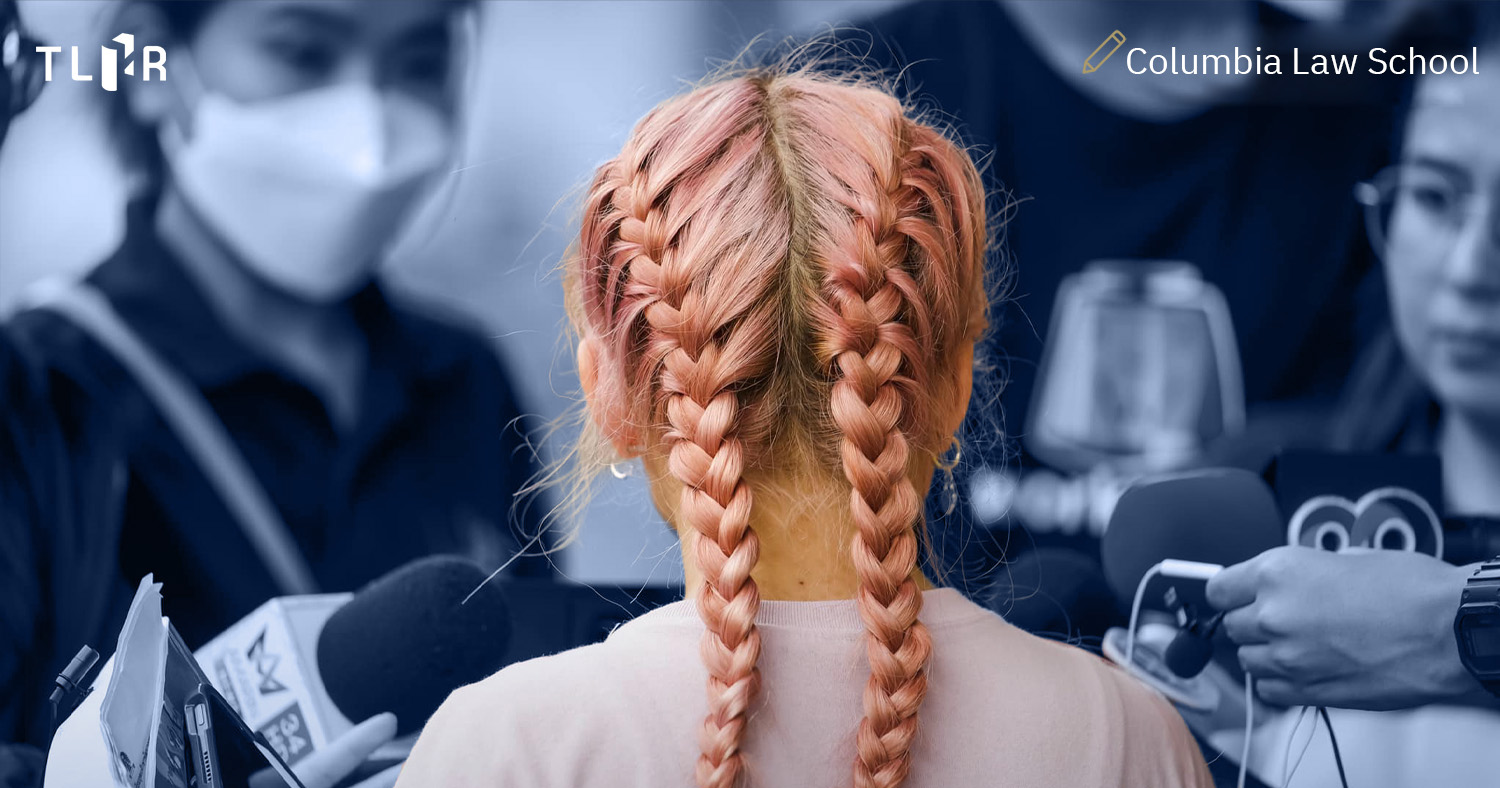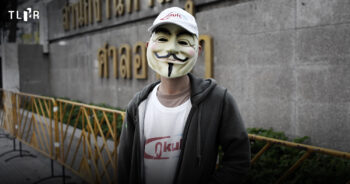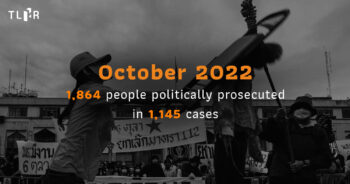Columbia Law School
On June 13, school administrators expelled 15-year-old Thanalop “Yok” Phalanchai from Triam Udom Suksa Phatthakan School. She is the youngest child known to have been charged with Thailand’s lese-majeste law to date. In a statement later released by the school, Yok’s expulsion was solely because she failed to enroll by the agreed upon June 10th deadline. The school claims that Yok did not enroll promptly with her mother within the last day of school to register for a student amount in the DMC (Data Management Center) of the Ministry of Education of Thailand, to which Yok responded by saying that she was no longer in the legal guardianship of her parents, she had paid her fees and enrolled with the practical guardian and had been a student since May 22.1
Following her expulsion, Yok continued to attend school, climbing over the fence in order to attend classes on June 14, 15, and 16.2 The following week, she continued to appear at school. Each time Yok fought her way into the school, she insisted it was her right to receive an education and repudiated the school’s claims that her application was incomplete.
Under both international law and the Thai Constitution, Yok is correct in maintaining that she has a right to attend school.
International Law
Yok has a number of international claims to support her argument that she has the right to access her education.
First, under Article 26 of the Universal Declaration of Human Rights (UDHR), endorsed by Thailand in 1948, “everyone has the right to an education.” Thailand was one of the first supporters of the UDHR, and according to UNICEF Thailand, has been quite progressive and generous in providing education for everyone, whether Thai nationals, undocumented migrants, or stateless children.3 Yet, Yok is being denied this right.
Article 28 of the Convention on the Rights of the Child (CRC), acceded to by Thailand on 12 February 1989, “recognizes the right of the child to education.” States are also encouraged to “take measures to encourage regular attendance at schools” and “[reduce] drop-out rates.” Article 28(1)(e). Triam Udom Suksa Phatthakan School seems to be doing the exact opposite here by explicitly barring Yok from attending her classes.
While the school insists that her expulsion is due to the fact that she did not promptly enroll with her mother, there may be ulterior motives, such as discrimination against her due to her status as a lese-majeste defendant. While it is impossible to prove Triam Udom Suksa Phatthakan School’s reasoning, it must be iterated that if this plays a role in the school’s decision, it is directly against the CRC. Under Article 29(b) of the Convention, states are to help children develop a “respect for human rights and fundamental freedoms, and for the principles enshrined in the Charter of the United Nations.” Additionally, under Article 13(1) and Article 14(1), children are granted the right to freedom of expression and freedom of thought, conscience and religion, respectively. These Articles, agreed to by Thailand, mean that Yok is free to express her opinions, and the school is required to respect them and refrain from punishing her for them.
Thailand in comparison to the US
Thailand’s Constitution (2017) contains rather strong provisions supporting Yok’s presumptions over her right to an education. In fact, compared to the United States, Yok has a somewhat stronger claim to her right to education than a US citizen would.
Unlike the United States, a Thai citizen’s right to education is written explicitly in their Constitution under Section 54, which states that every individual is guaranteed “quality education for twelve years from pre-school to the completion of compulsory education free of charge.”4 This means that Yok is guaranteed her education in forms of availability and accessibility. This provision is actually stronger than that of the United States, as the right to education is found nowhere in our Constitution, and in fact, is not even seen as a fundamental right. See San Antonio Indep. Sch. Dist. v. Rodriguez, 411 U.S. 1 (1973), Plyler v. Doe, 457 U.S. 202 (1982). Rather, education in the United States is left to the control of the States and is then protected Constitutionally under the Equal Protection Clause of the 14th Amendment. Through Court precedent, it has been established in the United States that education is a foundational element of citizenship, and therefore, the Equal Protection Clause prevents States from negatively impacting public education. Brown v. Bd. of Educ., 347 U.S. 483 (1954). This means that individuals in the US are guaranteed equal access to public education within the US through court precedent. The right to education has also been signed into law through a number of acts. Most recently, a child’s right to education in the United States is protected under the Every Student Succeeds Act (ESSA).
In most states (though rules and regulations vary among states), before a child can be expelled from school, there is a hearing held within eleven days of suspension. In Yok’s case, there was no such hearing.
There is also the added layer of Yok’s parents’ lack of legal guardianship. Due to Yok’s claim that she is no longer under her parents’ legal guardianship, Yok could be seen as a foster child in the United States. As of April 2020, approximately 38 US States and the District of Columbia have developed services and laws to ensure that youth foster children can complete their secondary education.5 For an example, if Yok were a foster child living in California, she would still be granted her equal right to education regardless of whether her parents signed the paperwork or not.6
Furthermore, in many states, a foster child cannot be expelled from her school without her attorney and social worker being notified. She could also request a formal hearing where she would be represented by her attorney before any expulsion could occur.
Nothing of this sort occurred before Yok was expelled from Triam Udom Suksa Phatthakan School. Not only does Yok deserve the right to access education under international and Thai law, but she also has strong arguments to request a hearing in which she can be represented by counsel.
Conclusion Yok is right to demand her right to education be given to her by the school. This right is enshrined in the Thai Constitution and is also binding on Thailand through their international agreements and customary practice. Comparatively, Thailand has stronger laws on the books for a child’s right to education than the US does. Yet, foster children in the US seem to have stronger protections regarding their education. Yok’s school breaks both domestic and international law by expelling her with no warning, and preventing her from legally attending school.
References:
1 thaipbsworld.com/rebel-student-on-lese-majeste-charge-expelled-from-school/
3 https://www.unicef.org/thailand/reports/education-knows-no-border#:~:text=Highlights,undocumented%20migrants%20or%20stateless%20children
4 An English translation of Thailand’s Constitution can be found here: https://www.constituteproject.org/constitution/Thailand_2017.pdf
5 Child Welfare Information Gateway. (2020). Educational supports for youth in foster care. Washington, DC: U.S. Department of Health and Human Services, Administration for Children and Families, Children’s Bureau. Available at https://www.childwelfare.gov/pubpdfs/educationalsupports.pdf. These states are representative of the US political spectrum, including states of conservative leaning, liberal leaning, and moderate leaning.
6 See an infographic explaining these laws here: https://www.scoe.org/blog_files/fosteryouthedrights%20(1).pdf




